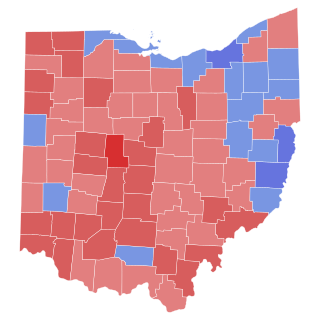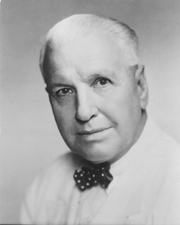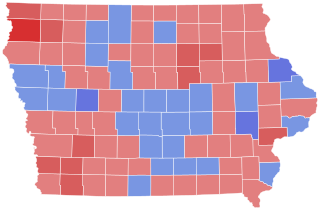
Otha Donner Wearin was an American writer and politician. Elected as the youngest member of President Franklin D. Roosevelt's first "New Deal" Congress, his political career stalled in 1938 when he gave up his seat in the United States House of Representatives at Roosevelt's urging to run for a U.S. Senate seat held by another Democrat, Guy Gillette, but primary voters rallied behind Gillette. He became a prolific writer, which led to his election to the Cowboy Hall of Fame.

Guy Mark Gillette was an American politician serving as a Democratic U.S. Representative and Senator from Iowa. In the U.S. Senate, Gillette was elected, re-elected, defeated, elected again, and defeated again.
Albert Joel "A. J." Loveland, served as Under-Secretary of Agriculture, now known as United States Deputy Secretary of Agriculture, under President Harry S. Truman. Loveland was appointed to the post by Truman in 1948 and served until March 27, 1950, to run for congress. A member of the Democratic Party, Loveland ran unsuccessfully against Republican Bourke Blakemore Hickenlooper for the U.S. Senate election in 1950.

The 1958 United States Senate election in Massachusetts was held on November 4, 1958. Democratic incumbent John F. Kennedy was reelected to a second six-year term, defeating Republican candidate Vincent J. Celeste.

The 1942 United States Senate election in Iowa took place on November 3, 1942. Incumbent Democratic Senator Clyde Herring ran for re-election to a second term but was defeated by Republican Governor George A. Wilson.

The 1968 United States Senate election in Ohio took place on November 5, 1968. Incumbent Senator Frank Lausche ran for re-election to a third term, but lost the Democratic primary to former U.S. Representative John J. Gilligan. Before losing the primary to the more solidly liberal Gilligan, Lausche had one of the most conservative voting record among Senate Democrats, leaving the Democratic Party very disappointed. In the general election, Gilligan lost to Republican Ohio Attorney General William Saxbe in a close race. Saxbe's victory increased the number of Senate Republicans in the 91st Congress. He would serve 5 years in the Senate before being nominated by President Richard Nixon to be U.S Attorney General, he resigned the seat after being confirmed. Gilligan, who in January 1974 was serving as the Governor of Ohio, named Saxbe's successor.

The 1938 United States Senate election in Iowa took place on November 8, 1938. Incumbent Democratic Senator Guy M. Gillette, who won a special election to complete the unexpired term of Richard Louis Murphy, won a full term in office by defeating Republican former Senator Lester J. Dickinson. Gillette and Dickinson had briefly served together in the final months of 1936.

The 1948 United States Senate election in Iowa took place on November 2, 1948. Incumbent Republican Senator George A. Wilson ran for re-election to a second term but was defeated by Democratic former Senator Guy Gillette.

The 1956 United States Senate election in Iowa took place on November 6, 1956. Incumbent Republican Senator Bourke B. Hickenlooper was re-elected to a third term in office over Democrat Rudolph M. Evans.

The 1944 United States Senate election in Iowa took place on November 7, 1944. Incumbent Democratic Senator Guy M. Gillette ran for a second full term in office but was defeated by Republican Governor Bourke B. Hickenlooper.

The 2020 United States Senate election in Colorado was held on November 3, 2020, to elect a member of the United States Senate to represent the State of Colorado, concurrently with the 2020 U.S. presidential election, as well as other elections to the United States Senate, elections to the United States House of Representatives and various state and local elections.

The 1946 United States Senate election in Tennessee was held on November 5, 1946. Incumbent Democratic Senator Kenneth D. McKellar was re-elected to a sixth term in office. He defeated a primary challenge by Edward W. Carmack Jr. and easily won the general election against Republican William B. Ladd, and Independent candidate John Randolph Neal Jr.

The 1954 United States Senate election in Iowa took place on November 2, 1954. Incumbent Democratic Senator Guy Gillette ran for re-election to a second term but was defeated by Republican U.S. Representative Thomas E. Martin.

The 1960 United States Senate election in Iowa took place on November 8, 1960. Incumbent Republican Senator Thomas E. Martin did not run for re-election to a second term. Jack Miller won the open seat by defeating Democratic Governor Herschel Loveless.

The 1962 United States Senate election in Maryland was held on November 6, 1962. Incumbent Republican U.S. Senator John Marshall Butler did not run for re-election to a third term in office. Democratic U.S. Representative Daniel Brewster won the re-election to succeed him easily over Republican U.S. Representative Edward Tylor Miller.

The 1962 United States Senate election in Iowa took place on November 6, 1962. Incumbent Republican Senator Bourke B. Hickenlooper was re-elected to a fourth term in office over Democrat E.B. Smith.

The 1966 United States Senate election in Iowa took place on November 8, 1966. Incumbent Republican Senator Jack Miller was re-elected to a second term in office over Democrat E.B. Smith.

The 1968 United States Senate election in Iowa took place on November 5, 1968. Incumbent Republican U.S. Senator Bourke B. Hickenlooper retired. The open seat was won by Democratic Governor Harold E. Hughes, narrowly defeating Republican State Representative David M. Stanley.

The 1952 Iowa gubernatorial election was held on November 4, 1952. Incumbent Republican William S. Beardsley defeated Democratic nominee Herschel C. Loveless with 51.90% of the vote.

The 1942 Iowa gubernatorial election was held on November 3, 1942. Republican nominee Bourke B. Hickenlooper defeated Democratic nominee Nelson G. Kraschel with 62.75% of the vote.



















